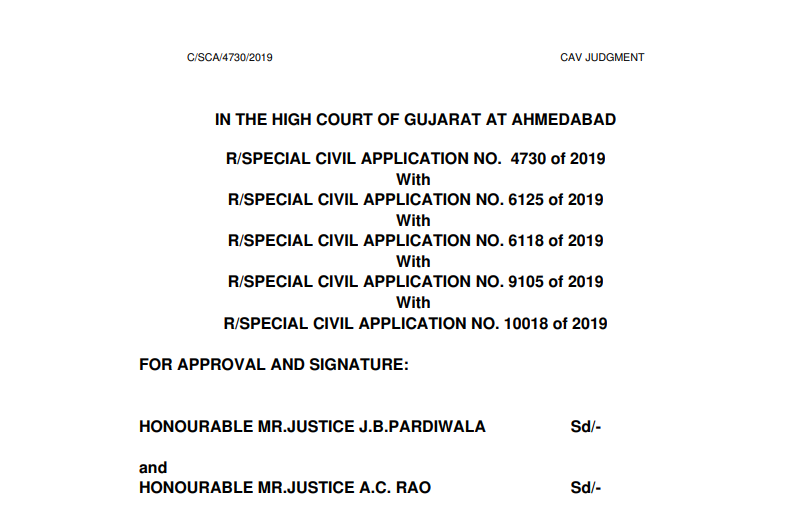Gujarat HC in the case of Synergy Fertichem Pvt. Ltd. Versus State of Gujarat
Case Covered:
Synergy Fertichem Pvt. Ltd.
Versus
State of Gujarat
Facts of the case:
Since the issues raised in all the captioned writ applications are the same, those were heard analogously and are being disposed of by this common judgment and order.
We have been called upon to look into and interpret the provisions of Sections 129 and 130 respectively of the Central Goods & Services Tax Act, 2017 (for short “the CGST Act”) amidst a lot of hues and cry at the instance of the writ applicants (dealers) redressing the grievance that the authorities concerned are invoking the power to confiscate the goods and the conveyance under Section 130 of the GST Act arbitrarily and without any application of mind. In such circumstances, we need to look into the two provisions and try to ascertain whether the two provisions overlap or are independent of each other. We take notice of the fact that both the provisions, i.e., Sections 129 and 130 of the GST Act start with a non-obstante clause.
Related Topic:
Non-obstante clause, How to interpret?
Observations of the court:
We would sum up our conclusion of the points raised in the writ applications as follows;
“(i) Section 129 of the Act talks about detention, seizure, and release of goods and conveyances in transit. On the other hand, Section 130 talks about the confiscation of goods or conveyance and levy of tax, penalty, and fine thereof. Although, both the sections start with a non-obstante clause, yet, the harmonious reading of the two sections, keeping in mind the object and purpose behind the enactment thereof, would indicate that they are independent of each other. Section 130 of the Act, which provides for confiscation of the goods or conveyance is not, in any manner, dependent or subject to Section 129 of the Act. Both the sections are mutually exclusive.
(ii) The phrase “with an intent to evade the payment of tax” in Section 130 of the Act assumes importance. When the law requires an intention to evade payment of tax, then it is not a mere failure to pay tax. It must be something more. The word “evade” in the context means defeating the provisions of the law of paying tax. It is made more stringent by the use of the word “intent”. The assessee must deliberately avoid the payment of tax which is payable in accordance with the law. However, the element of mens rea cannot be read into Section 130 of the Act.
(iii) For the purpose of issuing a notice of confiscation under Section 130 of the Act at the threshold, i.e., at the stage of detention and seizure of the goods and conveyance, the case has to be of such a nature that on the face of the entire transaction, the authority concerned should be convinced that the contravention was with a definite intent to evade payment of tax. The action, in such circumstances, should be in good faith and not be a mere pretense. In other words, the authorities need to make out a very strong case. Mere suspicion may not be sufficient to invoke Section 130 of the Act straightway.
(iv) If the authorities are of the view that the case is one of invoking Section 130 of the Act at the very threshold, then they need to record their reasons for such belief in writing, and such reasons recorded in writing should, thereafter, be looked into by the superior authority so that the superior authority can take an appropriate decision whether the case is one of straightway invoking Section 130 of the Act.
(v) Even if the goods or the conveyance is released upon payment of the tax and penalty under Section 129 of the Act, later, if the authorities find something incriminating against the owner of the goods in the course of the inquiry, if any, then it would be permissible to them to initiate the confiscation proceedings under Section 130 of the Act.
(vi) Section 130 of the Act is not dependent on clause (6) of Section 129 of the Act.
(vii) Sections 129 and 130 respectively of the Act are mutually exclusive and independent of each other. If the amount of tax and penalty, as determined under Section 129 of the Act for the purpose of the release of the goods and the conveyance, is not deposited within the statutory time period, then the consequence of the same would be forfeiture of the goods and the vehicle with the Government. This does not necessarily imply that the confiscation proceedings can be initiated only in the event of the failure on the part of the owner of the goods or the conveyance in depositing the amount towards the tax and liability determined under Section 129 of the Act.
(viii) For the purpose of Section 129(6) of the Act, it would not be necessary for the department to establish any intention to evade payment of tax. If the tax and penalty, as determined under Section 129, is not deposited within the statutory time period, then the goods and the conveyance shall be liable to be put to auction and the sale proceeds shall be deposited with the Government.
(ix) Similarly, the reference to Sections 73 and 74 respectively of the Act is not warranted for the purpose of interpreting Sections 129 and 130 of the Act, more particularly, when they all are independent of each other. The provisions of Sections 73 and 74 of the Act are similar to the provisions of Section 11A of the Central Excise Act and Section 28 of the Customs Act, which deals with the adjudication proceedings. Despite this, Section 110 is present in the Customs Act, which speaks about the seizure, and similarly, Section 129 is present in the Act for detention/seizure. Therefore, Sections 129 and 130 of the Act have non-obstante clauses, whereby they can be operated upon in spite of Sections 73 and 74 of the Act.
(x) The provisions of sections 73 and 74 respectively of the Act deal with the ‘demands and recovery’ to be made by the assessing officer based upon the assessment, whereas the provisions of Section 129 of the Act deal with the ‘detention/ seizure’. While assessing the returns, if the assessing officer finds that the amount of tax has not been paid or erroneously refunded, or where the input tax credit has been wrongly availed or utilized for any reason, either with mala fide intention or without the same, as the case may be, the provisions of Section 73/74 of the Act would be invoked. However, the provisions of Section 129 of the Act deal with a situation where the evasion of tax/contravention of the Act/Rules is detected during transit itself, requiring the adoption of summary like proceedings. Therefore, the said provisions operate in different spheres.
(xi) The comparison of the provisions of the Customs Act/ Excise Act on one hand and the provisions of the Act on the other, as sought to be drawn on behalf of the writ applicants, is not correct. Section 110(1) of the Customs Act is not comparable to Section 129(1) of the Act inasmuch as, the provisions of Section 110 of the Customs Act contemplates that the proper officer may seize the goods which are liable for confiscation, whereas the provisions of Section 129 contemplate that the proper officer may detain/ seize the goods/ conveyance in transit in contravention of the provisions of the Act or the Rules.
(xii) The provisions of Sections 110(2) and 124 of the Customs Act do not contemplate that the goods which are seized are to be released in a specific time limit, much less, within a period of six months. Apropos this, the said sections merely cast a duty on the department to issue a show-cause notice within a period of six months from the date of seizure of goods, but the same does not contemplate as to how much time, the same has to be adjudicated upon. Therefore, the contention raised on behalf of the writ applicants that the goods which are seized are to be released within a short span of time and that the legislature has not contemplated retaining the goods pending the confiscation proceedings. is not tenable. In addition to the above, even otherwise, the provisions of Section 110A of the Customs Act, which deal with the ‘provisional release’ of the goods, do not contemplate the release of the goods only on payment of penalty and interest but the proposed amount of fine is also to be included for provisional release of the goods. In view of this, the amount of fine should be taken into account while directing the provisional release of the goods/ conveyance as per Section 129(2) read with Section 67(6) of the Act read with Rule 140 of the Rules.
(xiii) Although there is no serious challenge to the validity of the provisions of Sections 129 and 130 respectively of the Act, yet it is a settled principle of law that the power to levy tax includes all the incidental powers to prevent the evasion of such tax. The power to seize and confiscate the goods in the event of evasion of tax and the power to levy penalty is meant to check tax evasion and is intended to operate as a deterrent against the tax-evaders and are, therefore, ancillary or incidental to the power to levy a tax on the goods and thus, fall within the ambit and scope of the legislative powers.
(xiv) The goods are not liable to be detained on the ground that the tax paid on the product was less. In such circumstances, the Inspecting Authority is expected to alert the Assessing Authority to initiate appropriate proceedings “for assessment of any alleged sale at which the dealer will have his opportunities to put forward his pleas on law and on fact. The process of detention of the goods cannot be resorted to when the dispute is bona fide, especially concerning the eligibility of tax and, more particularly, the rate of that tax.
Judgement of the court:
We clarify that we have, otherwise, not gone into the merits of the petitions. All the petitions are at the stage of notice for the purpose of confiscation. In all the cases, this Court has ordered the interim release of the goods as well as the conveyance. This release is subject to the final outcome of the confiscation proceedings. We have not examined individual petition for the purpose of finding out whether the notice for confiscation under Section 130 of the Act is justified in the facts and circumstances of the case or not. We have laid down general principles with regard to the applicability of Sections 129 and 130 of the Act. Let these matters now be notified before the Hon’ble Court taking up tax matters for the purpose of deciding whether the confiscation notice deserves to be quashed and set aside or not.
Read the Full Decision:
If you already have a premium membership, Sign In.
 ConsultEase Administrator
ConsultEase Administrator
Consultant
Faridabad, India
As a Consultease Administrator, I'm responsible for the smooth administration of our portal. Reach out to me in case you need help.













